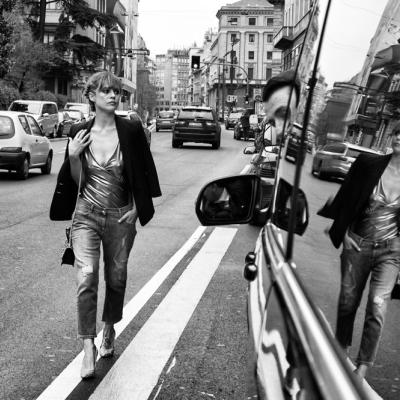
In difficult times, fashion is always scandalous.
(Elsa Schiaparelli)
Semi-serious chronicles from the streets of fashion
Coco Chanel used to say that a man can wear what he wants, it will always remain a woman's accessory. Observing the streets of Milan invaded by the glittering and colorful world of Fashion Week, Diego Bardone, with his ironic lens seems to go beyond the wisdom of Madamoiselle and almost affirm with granite certainty: I wear therefore I am!
In our opinion, the Milanese author's series is perfect in its interpretation of the people of fashion with skilful irony, which is only rarely veiled in sarcasm. The black and white of Bardone's style is already a sign of how this author tells fashion from a different point of view, outside of Fashion Powerness and inside Freedom Powerness. The originality of his gaze is the keystone of the story of Fashion as a mode of expression tout court, as he himself maintains: "The dress has always been a status symbol that is used to emulate or to stand out. Fashion dictates the times and sudden changes; it comes to life and gives new life from every social, political and economic change, becoming a real mirror of a society.
Users use it for their own need to belong to a group or, conversely, for the need to assert their supremacy over the masses. They are two parallel universes that coexist, but will never meet. During the fashion week, so much varied humanity, from the eccentric billionaire in the first photo, to the curious bystanders filming a fashion show with their mobile phones, meets/clashes in the streets of Milan, often giving rise to surreal and funny situations".
Irony is the spice of life: tell me how you dress and I'll tell you who you are, maybe...!
-------
Diceva Coco Chanel che Un uomo può indossare ciò che vuole, resterà sempre un accessorio della donna. Osservando le strade di Milano invase dal rutilante e colorato mondo della Fashion week, Diego Bardone, con il suo ironico obiettivo sembra andare oltre la saggezza di Madamoiselle e quasi affermare con granitica certezza: Indosso quindi sono!
La serie dell’autore milanese è a nostro avviso perfetta nel suo interpretare con sapiente ironia, che solo raramente si vela di sarcasmo, il popolo del Fashion. Il bianco e nero proprio della cifra stilistica di Bardone è già un segnale di come questo autore racconti la moda da un punto di vista altro, fuori dal Fashion Powerness e dentro il Freedom Powerness. L’originalità del suo sguardo è la chiave di volta del racconto del Fashion come modus espressivo tout court, come lui stesse sostiene: “L'abito, da sempre, è uno status symbol che viene usato per emulare o per distinguersi. La moda detta i tempi e i repentini cambiamenti; prende vita e nuova linfa da ogni mutamento sociale, politico ed economico, diventando specchio reale di una società.
I fruitori la usano per il proprio bisogno di appartenere ad un gruppo o, per contro, per la necessità di affermare la propria supremazia sulla masse. Sono due universi paralleli che convivono, ma che non si incontreranno mai. Durante la fashion week tanta variegata umanità, dal miliardario eccentrico della prima foto, ai curiosi astanti che riprendono con i loro cellulari una sfilata, si incontra/scontra per le strade di Milano, spesso dando vita a situazioni surreali e divertenti”.
L'ironia è il sale della vita: dimmi come ti vesti e ti dirò chi sei, forse...!
Bio Diego Bardone
I was born in Milan in 1963. My passion for photography grew when I was about 25 years old, and I worked for an Italian newspaper for a few years, then life took me "somewhere else" so I haven't been on the street for more than 20 years, but my passion has never died.
In my opinion, there's nothing better than being in front of a black and white photograph: you can't run away, you can close your eyes but in the end make sure it doesn't disappear like an image on a screen and you just have to look at it.
A little black, a little white and in the middle an infinite grayscale... That's life.
This is the way to keep our memory alive for those who will come after.
It's me, my passions and my little works. Robert Doisneau, Izis Bidermanas, Edourd Boubat and Mario Giacomelli, just to name a few, the ones I like the most...






















